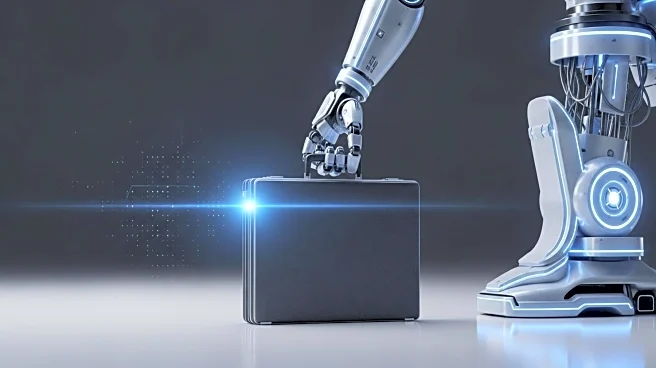What's Happening?
A report by Senate Democrats, led by Senator Bernie Sanders, warns that artificial intelligence could eliminate nearly 100 million jobs in the next decade. The report, produced by the Senate Health, Education, Labor and Pensions Committee, uses a ChatGPT-based analysis to predict that 'artificial labor' will significantly impact both white- and blue-collar professions. It estimates that 89% of fast food jobs, 64% of accounting roles, and 47% of trucking positions are at risk of automation. Sanders emphasized that AI and robotics developed by wealthy corporations could lead to massive job losses, reduce labor costs, and increase profits for corporate America. The report suggests that the proliferation of AI is not merely an innovation issue but a strategy by billionaires and tech CEOs to consolidate wealth and power at the expense of workers.
Why It's Important?
The report highlights a significant concern about the future of employment in the U.S. as AI technology advances. The potential loss of millions of jobs could have profound effects on the economy, increasing unemployment rates and potentially widening the wealth gap. The findings have sparked a debate between Democrats and Republicans, with Democrats advocating for proactive policies to mitigate job losses, such as a 32-hour workweek, profit-sharing, and a 'robot tax.' Republicans, however, caution against excessive regulation, arguing that it could hinder innovation and allow other countries, like China, to take the lead in AI development. The report underscores the need for balanced policies that protect workers while fostering technological advancement.
What's Next?
The report's recommendations, including a 32-hour workweek and a 'robot tax,' may influence future legislative proposals aimed at addressing the impact of AI on employment. As the debate continues, stakeholders such as labor unions, tech companies, and policymakers will likely engage in discussions to find solutions that balance innovation with job security. The potential for bipartisan cooperation or conflict on this issue could shape the legislative landscape regarding AI regulation and labor policies.
Beyond the Headlines
The ethical implications of AI-driven job losses raise questions about corporate responsibility and the role of government in protecting workers. The report suggests that AI's impact on employment is not just a technological issue but a societal challenge that requires careful consideration of workers' rights and economic equity. Long-term shifts in labor markets could necessitate changes in education and training programs to prepare the workforce for an AI-driven economy.









